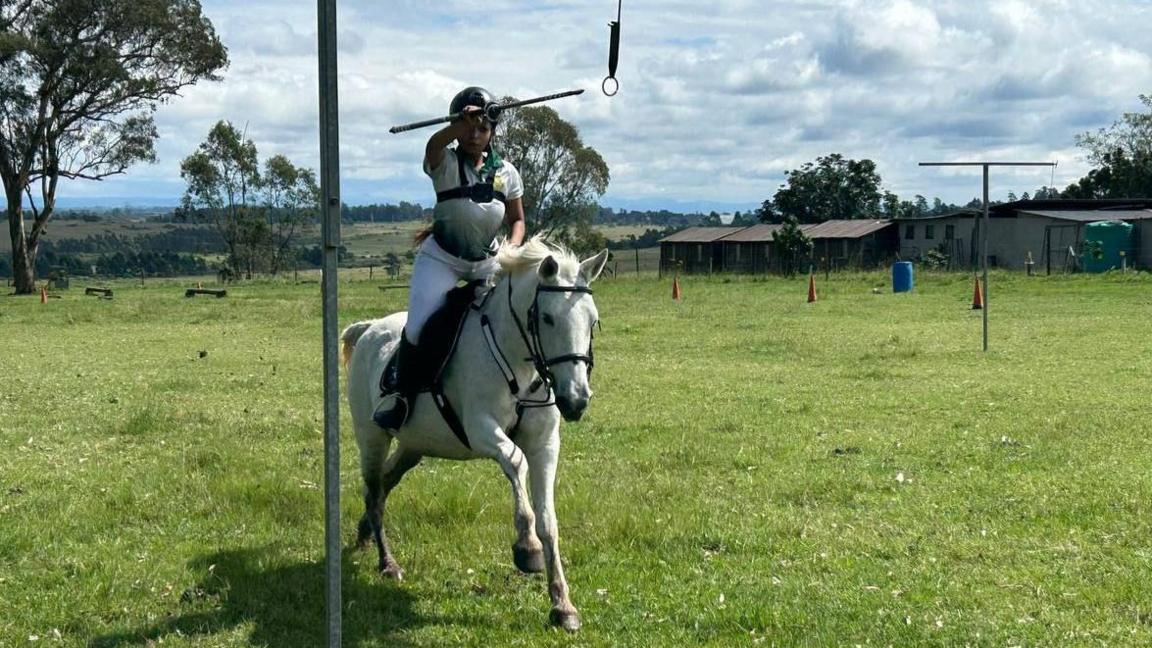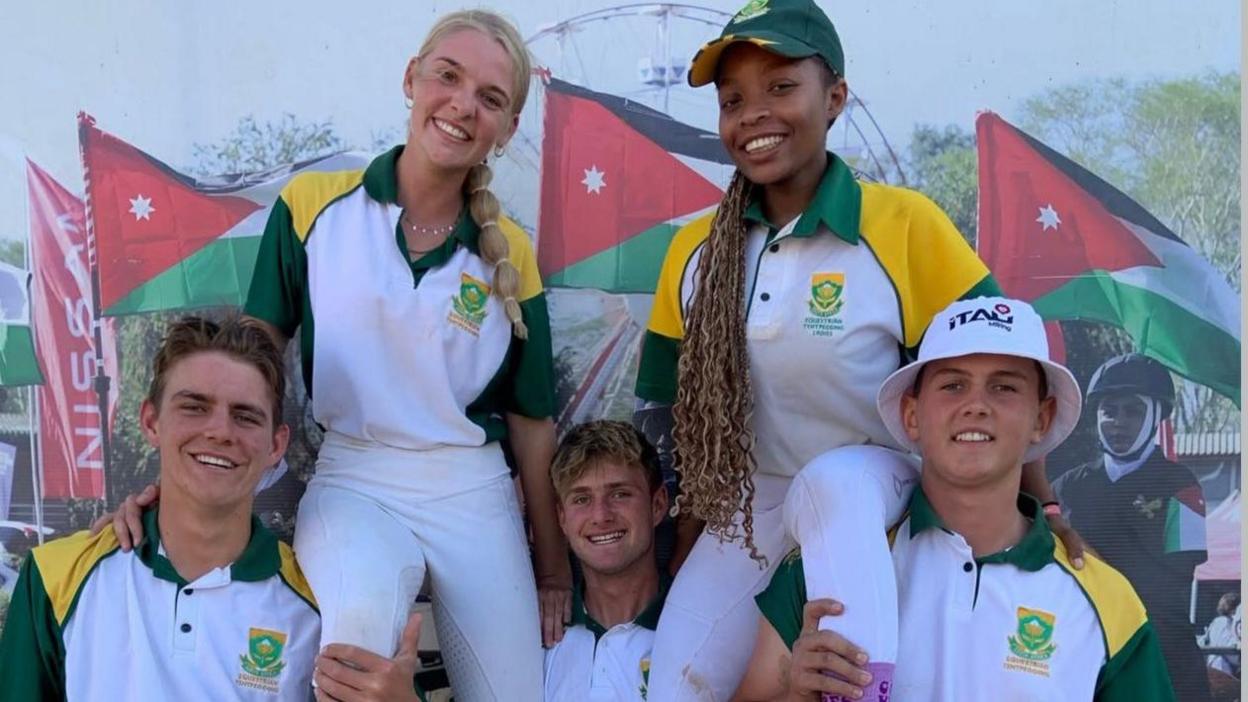'I don't want it to die' - The black teen pioneer preserving cavalry sport
Khosi Dlomo competes in tent pegging events across South Africa on her horse Yogi
- Published
Riding on a galloping horse with a lance in her right hand, Khosi Dlomo's face is a picture of concentration as she sizes up her target.
The South African teenager has little margin for error in her chosen sport of tent pegging.
The equestrian discipline has military origins, with competitors riding down a track before attempting to remove a small wooden peg from the ground with either a lance or sword.
"When you get a peg, it gives me an adrenaline rush," Dlomo told BBC Sport Africa.
"The competitive nature gives me an energy boost."
Carrying the peg away cleanly gives you six points, while striking it out of the ground secures four points and merely leaving a mark on the target gets two points.
With a maximum of 192 points on offer over the course of 32 attempts - and the pegs decreasing in height from 60mm to 40mm between rounds - riders are also evaluated on their skills in the saddle.
"Tent pegging is a mind game," Dlomo said.
"When you get on the horse, you need to know what your job is in order to make sure you work together.
"You have to multitask, have very good horsemanship and know how to take care of yourself."
As the only black female registered in tent pegging in sub-Saharan Africa, Dlomo's skills have taken her all the way to the sport's World Championships.
She has also become an unlikely advocate for a sport she stumbled upon by chance as a six-year-old.
"It's an amazing honour and opportunity that I've been gifted with. But I also feel a bit of pressure and a responsibility."
Early strides as a 'reckless' child

Dlomo goes through several different drills, including target practice, at her training base in Cato Ridge, KwaZulu-Natal to prepare for competition
Tent pegging originated in medieval India, but was spread to South Africa by British cavalrymen during the Second Boer War between 1899 and 1902.
Growing up in the suburbs of Durban, Dlomo's introduction to it came following a birthday party for a school friend.
"It was a horse riding party and then after I asked my mom 'Can I start horse riding?'."
The coach she found, Dalene Baksa, was herself heavily involved in tent pegging.
Yet Dlomo's mother did have some initial reservations over safety concerns about both riding and using either a lance or a sword to train.
"It takes a few months to get used to, but personally I wasn't really that scared of the weapons," Dlomo, now 19, said.
"I was quite a reckless kid.
"I'm just thankful that my parents were supportive and were willing to find something I was so passionate about. It didn't take a lot to win my mom over."
Tent pegging remains a niche sport in South Africa - and one dominated by the white middle class.
For Dlomo, the challenge is to appeal to a younger and more diverse audience.
"It's not publicised enough. Hardly anyone knows about it," she said.
"When I first came they weren't used to seeing a black rider.
"As the years went on I felt very welcomed and accepted. But I haven't seen any other black horse riders do tent pegging at competitions."
Sport 'in danger of extinction'
Costs provide a major barrier to increasing participation.
A spokesperson for the South African Equestrian Tentpegging Association estimated that the annual outlay required to keep a horse can be as much as 200,000 rand ($10,900, £8,250).
Dlomo keeps three horses; Shadida, Baloo and Yogi, with Yogi her regular mount for domestic competitions.
"Horses are expensive to maintain [with] their food, their vehicles and the tack that goes on them," Dlomo said.
"Then on top of that you have to travel with them wherever the competition is, and entry fees for competing are expensive.
"My mom complains all the time - why didn't I pick tennis or something cheap?"
Dlomo, who is now based in Stellenbosch and studying viniculture at university, wants to use her platform to help grow the sport.
"Unfortunately I do feel tent pegging is in danger of extinction," she said.
"The number of riders at the SA Championships have been getting smaller and smaller, which is disheartening.
"I don't want to see it die out."
Taking on the world

Dlomo helped South Africa to a fifth-placed finish at the World Tent Pegging Championships in Jordan in December last year
Dlomo's career highlight so far has been competing at the 2024 World Championships in Jordan.
While she is able to compete on her own horse, Yogi, in local competition, international rules state you must ride a different horse.
"That's what makes it a bit harder," Dlomo said.
"You don't have a connection with this horse, you don't know this horse. It's very clear to see when you don't have a connection.
"You're hanging off the side of a horse and need to trust this horse is stable. If you don't trust the animal it is not going to work out. I literally fell off."
However, she managed to help the South African team to a fifth-placed finish in Jordan.
As with some other equestrian events, tent pegging allows men and women to compete directly alongside one another, which Dlomo sees as empowering for females.
The fact that mentality is more important than physical strength makes the sport more egalitarian.
"When teams are selected, they first do a women's team and a male team," she said.
"Then it comes to a merit team. You're saying 'Let's take our five best riders regardless of gender and age'.
"What I love about the sport is that you're not looking at my gender, you're looking at my capabilities as a rider and my horsemanship."